#south american authors
Text

IV - Nobody comes in here with words by Diana Bellessi (tr. Leo Boix)
#quote#typography#nobody comes in here with words#diana bellessi#leo boix#literature#poetry#dark academia#light academia#aesthetic#bodymind#desire#argentinian poetry#south american poetry#south american authors#argentinian authors
7 notes
·
View notes
Photo
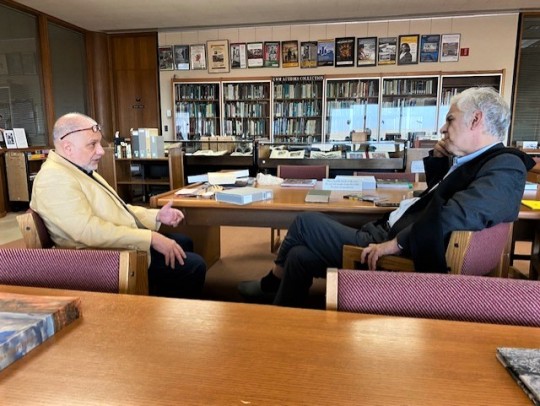

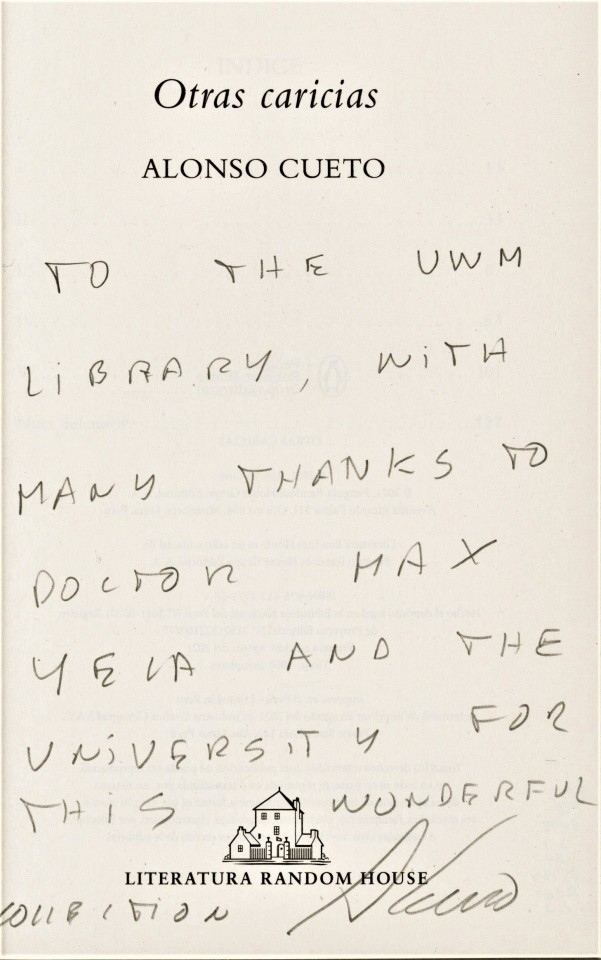
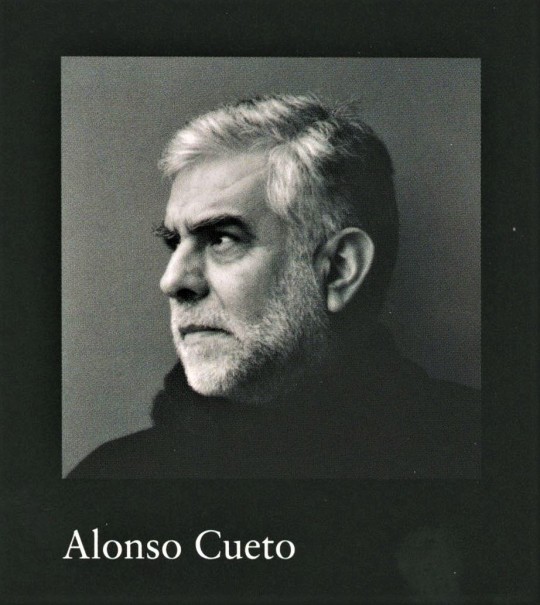
A Visit with Alonso Cueto
Last week UWM Special Collections co-sponsored a lecture by the internationally-acclaimed, award-winning Peruvian writer Alonso Cueto, who was here to discuss his current writing project on the first Mestiza in South America, Francisca Pizarro, who was also the daughter of Francisco Pizarro, the Spanish conquistador responsible for exploring and subjugating Peru.
The next day, Dr. Cueto made a visit to Special Collections where we spent a bit of time discussing many things, but particularly the writings of Melville and Joyce. He was enraptured by our first and very rare second printings of Moby Dick (the first printing is actually held by our sibling department, the American Geographical Society Library); our John Rodker/Egoist Press second printing of James Joyce’s Ulysses in its original blue paper wrappers and the 1935 Limited Editions Club printing of Ulysses, with original etchings by Henri Matisse, one of only 250 copies signed by both the author and the artist; as well as several incunables.
In return, besides scintillating conversation, Cueto inscribed a copy of his latest published novel to add to our comprehensive collection of signed works by him, Otras caricias (Other Caresses), printed in Peru in 2021 and published in Spanish by Random House, the same publishers of the first American edition of Joyce’s Ulysses in 1934.
Muchas gracias, Alonso, and I hope to spend time with you in Peru one day, mi amigo. Abrazos!
Ver una visita anterior con Alonso Cueto.
-- MAX, Head, Special Collections
#Spotlight#Alonso Cueto#Peruvian writers#South American authors#Latin American authors#Special Collections events
3 notes
·
View notes
Text
[D]omesticated attack dogs [...] hunted those who defied the profitable Caribbean sugar regimes and North America’s later Cotton Kingdom, [...] enforced plantation regimens [...], and closed off fugitive landscapes with acute adaptability to the varied [...] terrains of sugar, cotton, coffee or tobacco plantations that they patrolled. [...] [I]n the Age of Revolutions the Cuban bloodhound spread across imperial boundaries to protect white power and suppress black ambitions in Haiti and Jamaica. [...] [Then] dog violence in the Caribbean spurred planters in the American South to import and breed slave dogs [...].
---
Spanish landowners often used dogs to execute indigenous labourers simply for disobedience. [...] Bartolomé de las Casas [...] documented attacks against Taino populations, telling of Spaniards who ‘hunted them with their hounds [...]. These dogs shed much human blood’. Many later abolitionists made comparisons with these brutal [Spanish] precedents to criticize canine violence against slaves on these same Caribbean islands. [...] Spanish officials in Santo Domingo were licensing packs of dogs to comb the forests for [...] fugitives [...]. Dogs in Panama, for instance, tracked, attacked, captured and publicly executed maroons. [...] In the 1650s [...] [o]ne [English] observer noted, ‘There is nothing in [Barbados] so useful as … Liam Hounds, to find out these Thieves’. The term ‘liam’ likely came from the French limier, meaning ‘bloodhound’. [...] In 1659 English planters in Jamaica ‘procured some blood-hounds, and hunted these blacks like wild-beasts’ [...]. By the mid eighteenth century, French planters in Martinique were also relying upon dogs to hunt fugitive slaves. [...] In French Saint-Domingue [Haiti] dogs were used against the maroon Macandal [...] and he was burned alive in 1758. [...]
Although slave hounds existed throughout the Caribbean, it was common knowledge that Cuba bred and trained the best attack dogs, and when insurrections began to challenge plantocratic interests across the Americas, two rival empires, Britain and France, begged Spain to sell these notorious Cuban bloodhounds to suppress black ambitions and protect shared white power. [...] [I]n the 1790s and early 1800s [...] [i]n the Age of Revolutions a new canine breed gained widespread popularity in suppressing black populations across the Caribbean and eventually North America. Slave hounds were usually descended from more typical mastiffs or bloodhounds [...].
---
Spanish and Cuban slave hunters not only bred the Cuban bloodhound, but were midwives to an era of international anti-black co-ordination as the breed’s reputation spread rapidly among enslavers during the seven decades between the beginning of the Haitian Revolution in 1791 and the conclusion of the American Civil War in 1865. [...]
Despite the legends of Spanish cruelty, British officials bought Cuban bloodhounds when unrest erupted in Jamaica in 1795 after learning that Spanish officials in Cuba had recently sent dogs to hunt runaways and the indigenous Miskitos in Central America. [...] The island’s governor, Balcarres, later wrote that ‘Soon after the maroon rebellion broke out’ he had sent representatives ‘to Cuba in order to procure a number of large dogs of the bloodhound breed which are used to hunt down runaway negroes’ [...]. In 1803, during the final independence struggle of the Haitian Revolution, Cuban breeders again sold hundreds of hounds to the French to aid their fight against the black revolutionaries. [...] In 1819 Henri Christophe, a later leader of Haiti, told Tsar Alexander that hounds were a hallmark of French cruelty. [...]
---
The most extensively documented deployment of slave hounds [...] occurred in the antebellum American South and built upon Caribbean foundations. [...] The use of dogs increased during that decade [1830s], especially with the Second Seminole War in Florida (1835–42). The first recorded sale of Cuban dogs into the United States came with this conflict, when the US military apparently purchased three such dogs for $151.72 each [...]. [F]ierce bloodhounds reputed to be from Cuba appeared in the Mississippi valley as early as 1841 [...].
The importation of these dogs changed the business of slave catching in the region, as their deployment and reputation grew rapidly throughout the 1840s and, as in Cuba, specialized dog handlers became professionalized. Newspapers advertised slave hunters who claimed to possess the ‘Finest dogs for catching negroes’ [...]. [S]lave hunting intensified [from the 1840s until the Civil War] [...]. Indeed, tactics in the American South closely mirrored those of their Cuban predecessors as local slave catchers became suppliers of biopower indispensable to slavery’s profitability. [...] [P]rice [...] was left largely to the discretion of slave hunters, who, ‘Charging by the day and mile [...] could earn what was for them a sizeable amount - ten to fifty dollars [...]'. William Craft added that the ‘business’ of slave catching was ‘openly carried on, assisted by advertisements’. [...] The Louisiana slave owner [B.B.] portrayed his own pursuits as if he were hunting wild game [...]. The relationship between trackers and slaves became intricately systematized [...]. The short-lived republic of Texas (1836–46) even enacted specific compensation and laws for slave trackers, provisions that persisted after annexation by the United States.
---
All text above by: Tyler D. Parry and Charlton W. Yingling. "Slave Hounds and Abolition in the Americas". Past & Present Volume 246, Issue 1, pages 69-108. February 2020. [Bold emphasis and some paragraph breaks/contractions added by me.]
#abolition#its first of february#while already extensive doumentation of dogs in american south in 1840s to 60s#a nice aspect of this article is focuses on two things#one being significance of shared crossborder collaboartion cooperation of the major empires and states#as in imperial divisions set aside by spain britain france and us and extent to which they#collectively helped each other crush black resistance#and then two the authors also focus on agency and significance of black resistance#not really reflected in these excerpts but article goes in depth on black collaboration#in newspapers and fugitive assistance and public discourse in mexico haiti us canada#good references to transcripts and articles at the time where exslaves and abolitionists#used the brutality of dog attacks to turn public perception in their favor#another thing is article includes direct quotes from government and colonial officials casually ordering attacks#which emphasizes clearly that they knew exactly what they were doing
21 notes
·
View notes
Text

Pagu helped to lead Brasil into the Modern age!
📖🇧🇷📚
#history#patricia rehder galvao#parque industrial#pagu#brasil#revolutionary women#brazilian history#female author#socialism#artist#art history#latina#writer#girl power#brazilian#historical figures#art#south american history#communism#feminist#women empowerment#writing history#brazilian artists#nickys facts
45 notes
·
View notes
Note
What is wheel of time and should I start it tomorrow?
you SHOULD.
Wheel of Time is an epic fantasy series by the late Robert Jordan. It's epic in scope, in length, and in its insanely large cast of characters. It's fascinating. The worldbuilding is insane, but also familiar (partly because it relies on widespread fantasy tropes, partly because it made many of those tropes popular for many books published later). The characters are exasperating but deeply human; I love SO many of them and appreciate so many others. It's very Of Its Time in some regards, especially re: its handling of gender roles and sexuality, but it's also surprisingly progressive and queer in intent even when the execution falters, and I really appreciate a lot that it even tried to Go There, because it was Very formative for me as a young teen. It's also one of those books where you can see the author's kinks all over the place (both narrative and otherwise) and tbh? it's a bit cringe but lots of fun. Also it’s very well written; the plot is as Epic as epic fantasy gets but it’s really the character moments that make the reader invested in the story. I just love it a lot, ngl.
Fun fact: I am now today on tumblr dot com, blogging in english, because sometimes around age 15 even though I fucking hated english class in school I just couldn’t wait for the latest books to come out in my country so I had to become fluent enough to read a 700-pages novel by myself. THAT is the grip this series had on me.
Some things I am now into because of reading WoT starting at age eleven.
codependent magical bonds with loyalty kink thrown in (if you’re familiar with TLT, think necro/cav but usually f/m. Not always though :) )
femdom. both F/f and F/m varieties
Propesized Savior trying to kill their humanity to become a figure larger than history (before realizing that's bullshit)
what if monastic(ish) order of sole women but also we had sex about it
unfortunately. a lot of weird kinks. I will elaborate on request but it’s better if I don’t right off the bat.
no, I lied. It wasn’t unfortunate. I appreciate it when authors are brave enough to let the banner of their id fly high
ruined civilizations and newer, less advanced civilizations rising from the wreckage. the collective understanding that you live in a post-apocalypse world. old scientific principles becoming magic
confronting your alternate dimension self, as a treat
dream sex
devil-may-care rogues who actually care a lot
alien morality, or cultural differences so big that they fundamentally are the same thing
people who are SO Wrong about everything but are 100% committed to their own personal moral code
whatever the fuck Mat’s luck had going on
“I know what my destiny is but I say: fuck you”
I can’t stress enough how many of my kinks (narrative; sexy in fiction only; sexy in RL) came directly from this series. Like, I know I’ve already said that but putting together this list made me think and. Oh my god.
SWORD MAIDENS
More practical information: there are 14 books. Yes, I know. The first book is The Eye of the World - it's fun and probably not exceptional even though you can feel the hints of how grand and insane the greater worldbuilding will be, and some characters really shine (Nynaeve!). The second book is where it really gets original, the third book is where I went from "books I like" to "series OF ALL TIME". If you don’t like it by book 4 then give up. If you like book 4 as much as I did you will never ever want to give up.
There's also an Amazon Prime show, currently S1 has been released! I haven't watched it beyond the first ep, but plan to do it soon; it's a lot more f/f than the books and the back half had some pacing issues (partly due to COVID fucking with the production) but definitely very iddy from what I've heard, and I’m very excited to check it out in time for S2.
tldr PLEASE read wheel of time!
#ask#Anonymous#wheel of time#wot#FORMATIVE SERIES OF ALL TIME#btw not worth going into it in the actual post but. when i say 'of its time' i mean 'conceived in the late 80s & plotted in the early 90s'#the author was a vietnam vet from the american south who identified as het & went to a military college#and they are SURPRISINGLY queer even with that#it's one of those cases where i'm like. yeah the execution was clumsy but. the fact that he tried gave Interesting results
166 notes
·
View notes
Text
Selva Almada
youtube
Selva Almada was born in 1973 in Villa Elisa, Argentina. Almada is regarded as one of the most powerful voices in contemporary Argentine and Latin American literature. Her first novel The Wind That Lays Waste was nominated for Argentinian Book of the Year upon its publication in 2012. In 2019, when it was published in English, it won the Edinburgh International Book Festival's First Book Award. Almada has been compared to William Faulkner, Carson McCullers, and Flannery O'Connor. She has been a finalist for the Tigre Juan Award, the Rodolfo Walsh Award, shortlisted for the Vargas Llosa Prize for Novels, and longlisted for the International Booker Prize. Almada's work has been translated into several languages, including Portuguese, French, Turkish, Swedish, and Italian.
#writers#woman writers#authors#books#argentina#latin america#latin american literature#latina#hispanic#south america#Youtube
3 notes
·
View notes
Text
"a silence, the whole house like an enormous ear..."
~ Julio Cortázar, Bestiary (tr. Paul Blackburn)
#julio cortázar#quotes#literature#literature quotes#lit quotes#literary quotes#quotations#south american literature#20th century literature#20th century lit#argentinian literature#argentinian author#book quotes#hispanic author#hispanic literature#book excerpt#lit excerpts#excerpts#short story#fiction#magic realism#translated literature
13 notes
·
View notes
Text
that thing wherein you're reading something and just KNOW
"this person has completely forgotten that the characters here live in Japan/Korea/China/Russia"
and is, instead, writing like an American.
#to be fair: jp & cn authors are just as guilty of narrow imaginations#but those authors are also the original content creators in these instances#with american fans later consuming asian-based content & rewriting them as wholly american#british media is somewhat better about not being orientalist nowadays (south asians are the UK's largest ethnic minority group)#globalization#americanisms#not an american#fandom things#it is very weird to see walmart show up in any story set in east asia#there are the odd american franchise there (starbucks & mcdonalds & 7-11 have HUGE presences in east asia)#but for the most part?#halloween and christmas are imported holidays used almost entirely for marketing purposes#fresh fruit is eaten everyday (bc - japan especially - these places are tropical)#milk is rare except as a flavour#because the vast majority of east asians are lactose intolerant#eating cereal for breakfast is WEIRD#rice cookers!!!#at least one parent will be MIA for most of a kid's life bc work culture - JP especially - is HELL#coming out is a weird american invention#(unless YOU are a person's significant other it's VERY rude to go around asking/talking about someone else's love life)#“well-behaved” teens have very limited spare time bc of school & clubs & cram school#highschoolers are “1st/2nd/3rd years” not freshmen/sophomores“ (seniors is still used)#ages of maturity are also Different & the culture around youth-adult interactions is less policed#cops are still awful (& having even the mildest of criminal offenses renders you a social pariah FOR LIFE)#blue anime hair/irises are supposed to read as “black with a blue undertone” (unless it's aqua or something egregriously unnatural)#red anime hair/irises are supposed to read as “reddish-brown” (unless it is explicitly addressed as unnatural)#pink is also supposed to be “brown”#the reason why anime uses such fantastic colouring in the first place?#EVERYONE'S HAIR/EYES ARE BLACK OR BROWNA#even dyed hair ends up less “blond” & more “light brown”
3 notes
·
View notes
Text
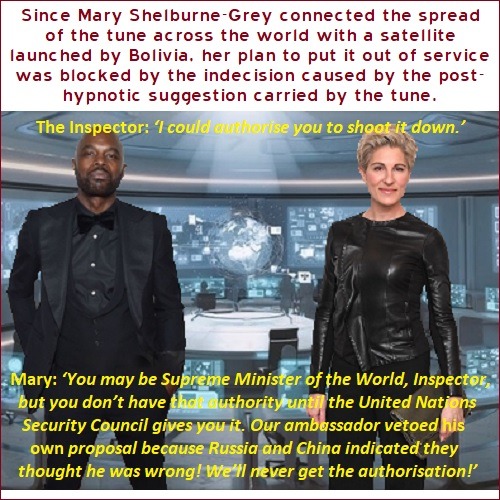
Since Mary Shelburne-Grey connected the spread of the tune across the world with a satellite launched by Bolivia, her plan to put it out of service was blocked by the indecision caused by the post-hypnotic suggestion carried by the tune.
The Inspector: ‘I could authorise you to shoot it down.’
Mary: ‘You may be Supreme Minister of the World, Inspector, but you don’t have that authority until the United Nations Security Council gives you it. Our ambassador vetoed his own proposal because Russia and China indicated they thought he was wrong! We’ll never get the authorisation!’
#Inspector Spacetime#The Chuckle (special)#Mary Shelburne-Grey (character)#World Intelligence Team#W.I.T.#she connected the spread of the tune#across the world#with a satellite#launched by a South American country#her plan was blocked#to put it out of service#post hypnotic suggestion#carried by the tune#the Inspector (character)#tries to authorise it#shoot it down#Mary knows better#Supreme Minister of the World#you don't have that authority#until the United Nations#U.N. Security Council#gives authority#UK ambassador#vetoed his own proposal#because other countries#indicated they opposed it#we'll never get the authorisation
2 notes
·
View notes
Text

IV - Nobody comes in here with words by Diana Bellessi (tr. Leo Boix)
#quote#typography#nobody comes in here with words#diana bellessi#leo boix#literature#poetry#dark academia#light academia#aesthetic#bodymind#argentinian poetry#south american poetry#south american authors#argentinian authors
2 notes
·
View notes
Text
Say what you will about Bungo Stray Dogs but the fact is that it has inspired a good number of an entire generation to pick up 1800s to 1900s great literature from Japan, North America, and Europe and i think that's very cool of it really
#and if not to actually read to books then to make them aware of their existence#and if you're like me to spiral on a tangent to see what other cool books not as well-teached countries have#honestly you guys the little ive managed to read among the bsd authors has been fascinating#the postwar mentality and the struggles of those who didnt have religion to fall back on as a center of morality and meaning#thats some GOOD stuff to dig into#of course you'll find that anywhere but each literary period has its own vibe#usually that vibe is oversimplified tbh...esp considering each period even questioned their own themes and moods and the liie#*like#im hoping asagiri also delves into south american and African literature as well as other parts of asia/middle east...#as they have pretty cool things as well...and also a really different postwar perspective to look at it from#mainly we're sort of seeing lit from what we could consider winners? of war (oversimplification i know)#which is amazing and all because of the schools of thought that pop up...#but it would be neat to see the schools of thought that pop up from the literary greats of the countries that were victimized in the war#esp because the victim/victor distinction is never as clear cut as it looks#but im rambling again oops....#this is actually a literature appreciation post disguised as a bsd appreciation post heh...#bsd#bungo stray dogs#bungou stray dogs#bsd musings#i havent mentioned australian lit....forgive me...i actually dont know if ive read any classic authors from there#though the modern authors from australia ive read are very good#spitting nonsense#rambling in the tags sorry#edit: or maybe dont go into other country lits cause....well it depends on how its handled really...#it would be cool but at the same time.....
21 notes
·
View notes
Text
well. that novella about the wild west but with hippos sure was a novella about the wild west but with hippos
#sorry apparently i just need to talk about this#i read it today and i'm...hmm.#it was fun. it was a fun read. the premise was WILD#and they world-built around it...well-enough?#it was just very light-hearted and cotton candy and the plot kinda just happened just bc you know?#i guess my expectations were just wrong#it is not a very serious book#also...#something abt white authors writing alternate-histories of the american south just...#never quite hits. idk
2 notes
·
View notes
Text
Love it when someone talks about a song or an artist they like, and every time you come across that music thereafter, it’s no longer just a song to you but it’s specifically that person’s song.
#the valley is posting#one of my friends sent me south by hippo campus for vyce and now every time i listen to it it's both a vyce song and a nimblebird song#also i've been on a very mild american authors kick lately and every time they come up on spotify i think about sola#there's also an anime opening that one of my friends accidentally downloaded to my mp3 when we were in middle school#and you better believe i've kept that song across multiple mobile devices even though i've never watched the anime
3 notes
·
View notes
Photo

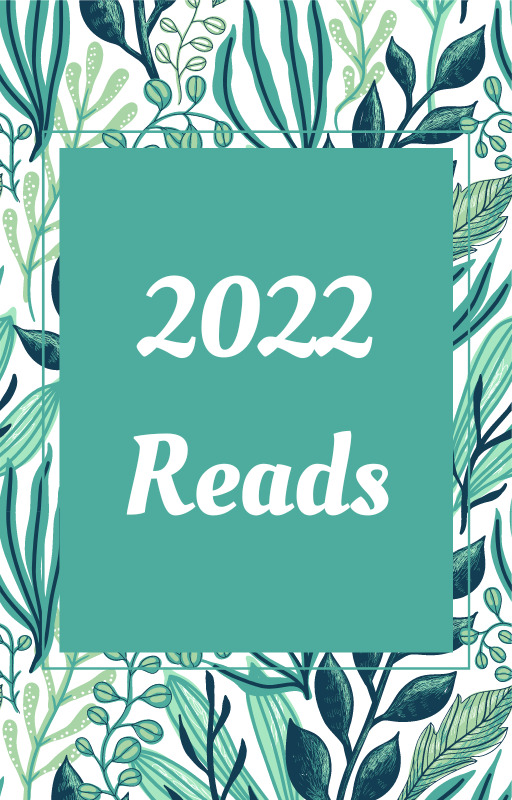
A pair of cosmic horror novellas
In the first, “The Sea Dreams it is the Sky,” a young woman strike up a friendship with a notorious poet who escaped the same (fictional) Latin American dictatorship she did and learns that he has spent life haunted by the task of translating a mysterious manuscript
The second novella, “My Heart Struck Horror,” a grieving librarian is sent to catalogue the estate of a recently deceased ethnomusicologist who studied blues music and finds himself enraptured by the dead man’s journals depicting his obsessive research regarding one devilish version of a folk song
Interesting to read the novellas paired together because in some ways they’re quite different tonally, but they’re also both unsettling stories of guilt and the dangerous pursuit of knowledge that play with form and narrative
Would recommend to fans of the podcast The Magnus Archives
The protagonist of the first novella is a Latina lesbian
#read this on a friend's recommendation!#i like horror that plays with form and features creepy songs or fucked-up books#these are less terrifying horror and more unsettling with a big side of the horrors of humanity#like the first novella is about a dictatorship#and the second one very much about the history of antiblack racism in the american south#can't speak for how well those topics were explored#but i the authors thanks consultants and has a long bibliography at the back#anyway i should read more epistolary horror…#a lush and seething hell#books#lulu speaks#lulu reads#lulu reads a lush and seething hell#2022 reads
4 notes
·
View notes
Note
Seven of pentacles for the tarot ask game?
56. SEVEN OF PENTACLES: LOOKING TO THE LONG-TERM (How long do you want to keep writing for? Is it a long-term goal?)
as long as im able to, mentally/physically. ive been writing since i was 8. there were years where i wrote a lot, years where i barely wrote two lines, but i love storytelling, i love reading and i love writing, so the only way i will stop is if im not physically/mentally capable to.
...now that doesnt mean i will try to get published/get success as an author forever. i dont have many hopes for that but itd be a nice bonus
thank you for the ask!
#i mean being a successful author is the dream but im south american i grew up under the idea that south americans arent writers lol#so my dreams were always very.... mild#which is nice bc my expectations are low#but at the same time it is a bit sad#buuuuut i think i will find happiness in writing#even if its never published#replies#mercurialsmile
1 note
·
View note
Text
Today I hid my writing.
Everything outright queer, everything that might be construed as supporting what an Evangelical would consider "perverse", everything that I wrote to work through the pain that was my life until I decided I wasn't going to kill myself. I found myself through the writing I did. I learned how to love myself through the fantasy I made.
Out of over two hundred works, I think I have twenty left. I orphaned, unpublished, and pulled things I poured my heart and soul.
Am I paranoid? Was going nuclear the right choice? I don't know. I have no way of knowing. I have no way of knowing if what I did was right. I can get almost everything back (minus what I orphaned). I'm terrified for my life right now. I live in the south, in a state historically hostile to queer rights, and I'm staring down the barrel of my continued existence being outlawed.
Is this grief? Despair? I don't know.
I just know that I'm terrified for my life right now.
#dispatches#original content? on this blog?#queer author#kiri's writing process#writing troubles#lgbt rights#deep south in america#american politics#god this sucks
2 notes
·
View notes